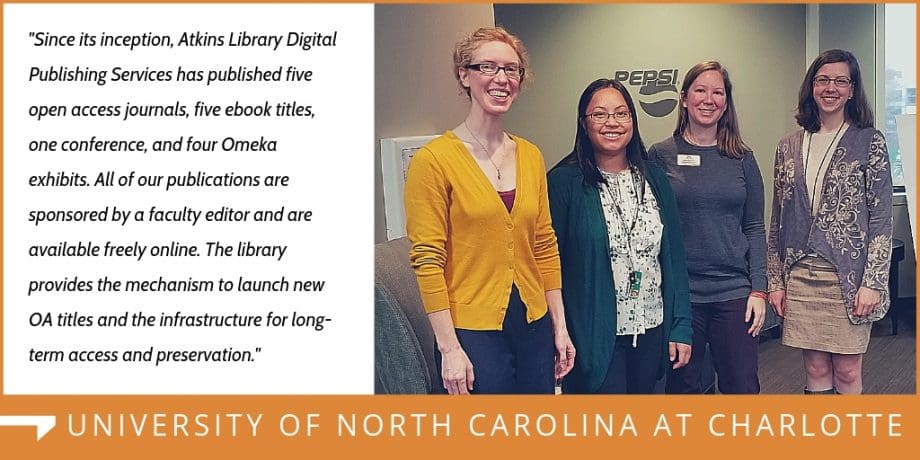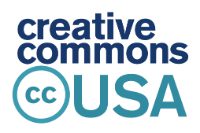
February 6, 2019
UNC Charlotte: Resourceful staffing, strategic publishing
By Somaly Kim Wu
In February 2019, we are publishing our second series of member profiles. These profiles showcase the wide variety of publishing work happening at member institutions, and celebrate our community’s contributions to the wider publishing landscape. This series will also spotlight resources the profiled institutions have contributed to the Shared Documentation library. Many thanks to the members who volunteered to answer our questions! See all of the published profiles, and look for a new one each week in February.
To learn more about their program, check out UNC Charlotte’s latest Library Publishing Directory entry.
Tell us a bit about your publishing program.
The J. Murrey Atkins Library Digital Publishing Services was established in 2012 as part of the then Digital Scholarship Lab. The service currently resides within Technology and Digital Strategies and is staffed by two full-time employees. The two positions that report directly include the Head of Library Technology and Innovation and the Special Collections and Digital Projects Assistant. In addition, the library draws upon the expertise of the Copyright and Licensing Librarian and Graphic and UX Designer for guidance and technical assistance. The mission of Library Digital Publishing is to support the publication of scholarly works, including online journals, ebooks, digital exhibits, and conference proceedings for researchers and faculty at the University of North Carolina at Charlotte. The services are built on robust publishing platforms that promote open knowledge exchange, wide scholarship discoverability, and innovative dissemination of scholarly communication. We utilize Open Journal Systems, Open Monograph Press, Open Conference Systems, and Omeka to support open access publishing for the campus. Since its inception, Atkins Library Digital Publishing Services has published five open access journals, five ebook titles, one conference, and four Omeka exhibits. All of our publications are sponsored by a faculty editor and are available freely online. The library provides the mechanism to launch new OA titles and the infrastructure for long-term access and preservation. In summation, we offer technical support, platform-specific software training, graphic design assistance, and one-on-one consultations to increase awareness and adoption of open access publishing.

From left to right: Christin Lampkowski (Special Collections and Digital Projects Assistant), Somaly Kim Wu (Head of Library Technology & Innovation) with Special Collections and University Archives staff, Rita Johnston (Digital Production Librarian) and Olivia Eanes (Reading Room & Archives Assistant) at the book talk for Miss Bonnie’s Nurses.


 On behalf of the LPC Board, we are delighted to announce that the recipient of the 2018 LPC Award for Exemplary Service is Matt Ruen (Grand Valley State University). Matt is being recognized for his dedicated service on the LPC Program Committee, and was praised by committee members as an “excellent listener who leads the group gently toward programmatic, thoughtful action.” In his second consecutive term as committee chair, Matt has guided the Program Committee during a time when the Library Publishing Forum has grown significantly, and has helped to create effective structures for program planning and handling an increasing volume of proposals.
On behalf of the LPC Board, we are delighted to announce that the recipient of the 2018 LPC Award for Exemplary Service is Matt Ruen (Grand Valley State University). Matt is being recognized for his dedicated service on the LPC Program Committee, and was praised by committee members as an “excellent listener who leads the group gently toward programmatic, thoughtful action.” In his second consecutive term as committee chair, Matt has guided the Program Committee during a time when the Library Publishing Forum has grown significantly, and has helped to create effective structures for program planning and handling an increasing volume of proposals.
 In addition to Redalyc, Dr. Becerril-García co-founded the Mexican Network of Institutional Repositories (REMERI), and founded AmeliCA, a community-driven initiative for Open Knowledge in Latin America and the Global South. As a professor at the Autonomous University of the State of Mexico, her research areas include open access, interoperability, linked data, and the semantic web. Recent works include
In addition to Redalyc, Dr. Becerril-García co-founded the Mexican Network of Institutional Repositories (REMERI), and founded AmeliCA, a community-driven initiative for Open Knowledge in Latin America and the Global South. As a professor at the Autonomous University of the State of Mexico, her research areas include open access, interoperability, linked data, and the semantic web. Recent works include